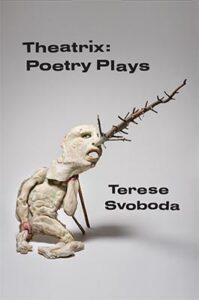 Today’s special guest is award-winning writer Terese Svoboda. We’re chatting about her new poetry collection, Theatrix: Poetry Plays.
Today’s special guest is award-winning writer Terese Svoboda. We’re chatting about her new poetry collection, Theatrix: Poetry Plays.
Bio:
The author of 19 books of poetry, fiction, memoir, biography, and translation, Terese Svoboda has won a Guggenheim and the Bobst Prize for fiction, the Iowa Prize for poetry, an NEH and a PEN/Columbia grant for translation, the Graywolf Nonfiction Prize, a Jerome Foundation prize for video, the O. Henry award for the short story, two Appleman awards, and a Pushcart Prize for the essay. She is also a three-time winner of the New York Foundation for the Arts fellowship, and has been awarded Headlands, James Merrill, Hawthornden, Bogliasco, Yaddo, MacDowell, Hermitage and Bellagio residencies. Her opera WET premiered at L.A.’s Disney Hall in 2005.
What do you enjoy most about writing poems?
Rewriting.
Can you give us a little insight into a few of your poems – perhaps a couple of your favorites?
Let’s hear it for play! We’ve already got COVID and malfeasance in politics and police brutality. In my eighth book of poetry, Theatrix: Play Poems, Shakespeare, Beckett, Hair, absurdist theater, the usher (the Fall of the House of) and theater made behind bedsheets ghost through the book to explode notions of subject and the fourth wall. Though the book also includes a Title IX report, the torture of a South Sudanese governor, Chernobyl, the murder of a NYC prostitute, and god-knows-what those schipperkes were doing for the French resistance – everywhere the poetic line claims its place as a stage for the world. Even the title puns on “tricks” as “poetry plays” at the genre of drama, and the suffix “trix” does the job of turning the masculine pov into the feminine (e.g. aviator, aviatrix). Elements of dramatic writing like interruptions or asides found inside brackets and character names cast in majuscule punctuate but do not dominate the book as the poetry slides in and through drama. Linked by an absurdist tone that combines the surreal, the political, and broad slapstick, often in one fell swoop, the poems in Theatrix: Play Poems don’t want to be “put on,” they want to play in the reader’s head, the mind being the greatest stage of all.
What type of project are you working on next?
I’ve been given a commission by some British friends to write the libretto for a dance opera. My memoir Hitler and My Mother-in-Law has just been approved by my agent so I have high hopes for its release.
When did you first consider yourself a writer / poet?
About five books in.
How do you research markets for your work, perhaps as some advice for not-yet-published poets?
Always read the magazine you’re interested in before submitting. Always rewrite anything that comes back.
What would you say is your interesting writing quirk?
Perseverance.
Anything additional you want to share with the readers?
It took fifteen years of work before I published my first novel.
Links:
Website | Publisher | Link for pre-order
Thanks for being here today!
